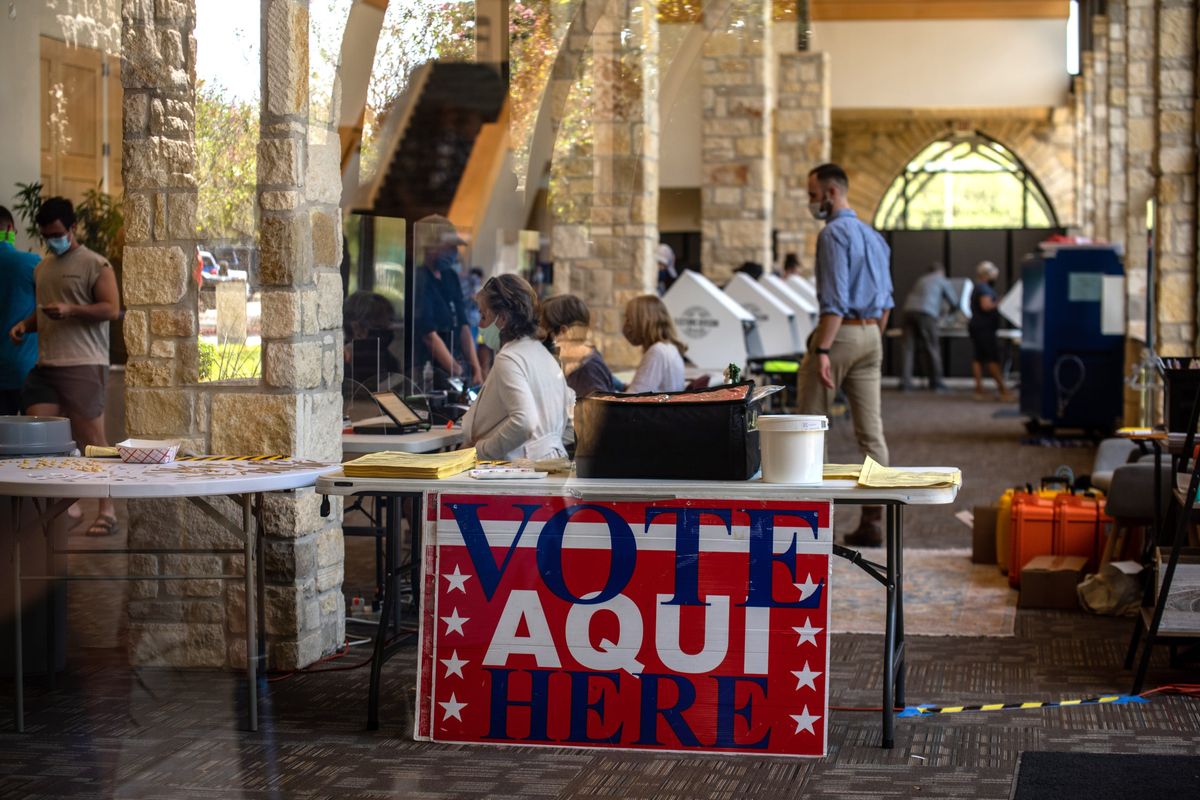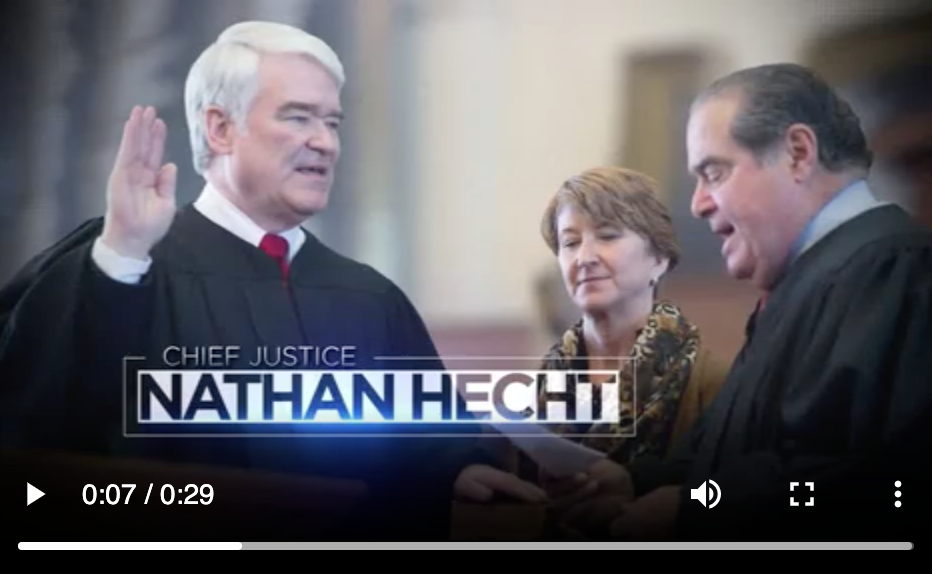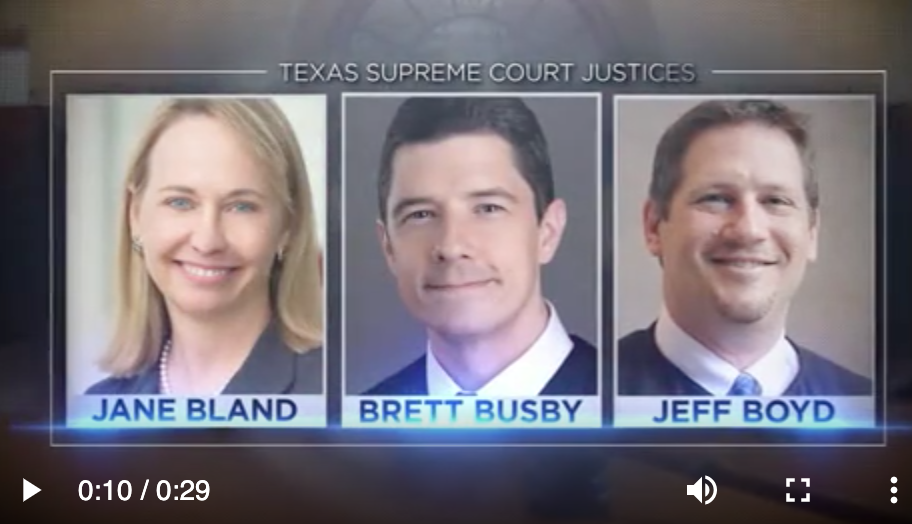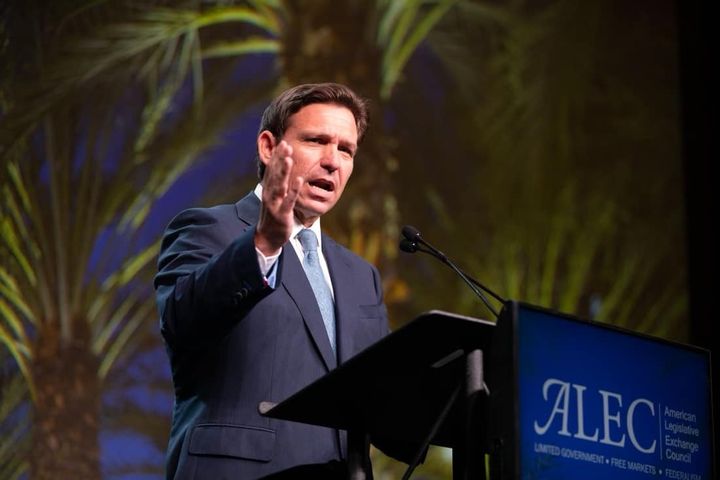Republican Texas Judges Get Big Money Boost Ahead of Redistricting
Oil and gas billionaires, private equity firms, and GOP megadonors are funding ads that aim to keep the Texas Supreme Court entirely in Republican hands as state voting trends shift from red to purple.

An outside spending group funded by a federal super PAC has spent $1.3 million on TV ads defending Texas Republican judges in the 2020 election, funneling support for their campaigns from wealthy donors whose businesses are likely to be impacted by the court’s decisions.
Judicial Fairness PAC, which is buying TV ads promoting four incumbent Republican Texas Supreme Court justices, received major early funding from a PAC that has received a bevy of million-dollar donations from Texas-based oil and gas billionaires, real estate moguls, and state Republican megadonors.
The Texas Supreme Court recently ruled on two major cases involving the energy industry, and the court could play a role next year in hearing legal challenges to new legislative districts drawn by state government after the completion of the 2020 census.
Spending on TV ads related to Texas judicial races has reached over $1.3 million as of Oct. 28, according to an analysis by the Brennan Center for Justice, a nonpartisan policy institute. That amount is nearly four times the $341,130 that was estimated to have been spent in 2016, and there are still several days left before voting ends this year. Judicial Fairness PAC does not have a public website, meaning that Texas voters cannot easily look up its true funding sources. State records show its treasurer is Lee Parsley, general counsel for influential tort reform organization Texans for Lawsuit Reform.
In the nine member Texas Supreme Court, where all seats are currently held by Republicans, four seats are up for election this year, including Chief Justice Nathan Hecht. Three seats on the Court of Criminal Appeals are also up this year.
Douglas Keith, counsel in the Brennan Center’s Democracy Program, says that this level of spending on state court elections is usually associated with the possibility of an ideological shift.
“Texas court races have not been particularly competitive, and while candidates themselves have raised large sums, we haven’t seen the kind of outside spending we’ve seen in some other states where there have been highly contested races,” said Keith. “Perhaps this spending is indicative of the perception that these races are more competitive than in the past.”
Virtually all of the spending on Texas judicial races is coming from Judicial Fairness PAC, which has purchased TV spots supporting Chief Justice Hecht and other GOP justices. Details about the PAC’s funding, over $4.2 million according to state records as of Oct. 28, is not easy for voters to access, but some information can be gleaned about its deep-pocketed Texan supporters through tracing back the money that has flowed to it from a federal PAC.
“There are a set of very wealthy interests who shape who sits on state high courts, and in a lot of circumstances the public won’t know who they are because the spending goes through multiple organizations, which creates the potential for conflicts of interest with judges deciding cases involving their campaign supporters,” said Keith.
Judicial Fairness PAC’s first disclosure report this year, covering the period from July 1 to Sept. 24, shows it was seeded by a $900,000 contribution from Engage Texas, a Texas-based PAC that is entirely funded by a $1.15 million donation from its federal super PAC affiliate, also called Engage Texas. The Texas Tribune reported earlier this year that the federal Engage Texas PAC had brought on hundreds of staffers with the goal of registering hundreds of thousands of voters and keeping the state red.
Engage Texas’ super PAC has received over $12.7 million this cycle, according to records maintained by the Center for Responsive Politics. While Texas Supreme Court justice candidates can only accept a total maximum contribution of $5,000 from individuals or entities in their elections, wealthy donors can issue unlimited donations to the state or federal PACs to spend on ads supporting the Republican candidates.

Engage Texas’ hefty donations are led by individuals and companies with interests in the Texas courts. Several of the super PAC’s largest contributions come from oil and gas concerns: $1 million from J.C. Walter III, chair of a family oil and gas exploration company; $1 million from billionaire Paul Foster, chair of El Paso-based oil company Western Refinery; $1 million from Dallas-based pipeline giant Energy Transfer; $500,000 from Houston billionaire Jeffrey Hildebrand, co-founder of oil and gas company Hilcorp Energy; and $500,000 from Petroplex Energy of Midland. Also notable is $750,000 from Nancy Kinder, the wife of billionaire Richard Kinder who co-founded Houston-based oil and gas infrastructure company Kinder Morgan.
Houston-based Jan Duncan, married to the late billionaire co-founder of oil company Enterprise Products Partners Dan Duncan, donated $1 million to Engage Texas. Jan Duncan has reportedly given $3.9 million to Women Speak Out, a PAC affiliate of the anti-abortion group Susan B. Anthony List, over the past two years.
The Texas Supreme Court recently heard cases directly affecting these billionaires’ oil and gas companies. Last year, the Court heard two landmark cases involving contracts and liabilities, including Energy Transfer Partners v. Enterprise Products Partners, issuing a ruling in late January that ended an eight-year legal battle. With oil and gas being one of the state’s leading industries, Engage Texas donors will likely be impacted by cases that the court takes up in the future. Even this week, the Texas Supreme Court debated a case involving oil and gas royalties.
Other top donors to Engage Texas come from the real estate industry: $1 million from Houston real estate developer Richard Weekley, a board member who also helps lead Texans for Lawsuit Reform; $1 million from Hillwood Development Company, the Dallas-based real estate company founded by Ross Perot, Jr.; and $1 million combined from Texas GOP megadonors Michael and Mary Porter, cattle ranchers and vast landowners. Private equity firm Trinity Equity Partners gave $1 million combined from its groups, and Dallas-based TRT Holdings gave $500,000 to the super PAC.
In a disclosure filed Oct. 26, Judicial Fairness PAC reported taking in nearly $3.3 million over multiple donations from Texans for Lawsuit Reform PAC. On Oct. 27, the PAC reported receiving $250,000 from Houston oil and gas company Apache Corporation, and an additional $60,000 from Texans for Lawsuit Reform PAC.
Last year, Texas lawmakers created a commission to study how state judges are elected on partisan lines. Their work comes after millionaire Salem Abraham, a Republican donor and early supporter of Texans for Lawsuit Reform, calculated that billion-dollar companies represented by one of nine elite law firms are over five times more likely to win in front of the Texas Supreme Court.
In Arizona, Wisconsin, and Kansas, there have been judicial races where outside groups spent between two-thirds and three-quarters of the money in the election, a report last year from the Brennan Center found, overshadowing the candidates’ spending.

Genevieve Van Cleve, the Texas state director for the National Democratic Redistricting Committee, the Democratic Party’s state redistricting group, told Sludge that the funders of Engage Texas are familiar donors to state Republican leaders.
“If you put [Lieutenant Governor] Dan Patrick’s funder list on top, these names would come up,” said Van Cleve. “A lot of pipeline money.”
In 2015, the Texas Legislature passed Senate Bill 455, which according to the National Council of State Legislatures “creates a special three-judge district court to hear any suit [that]… involves the apportionment of districts for the House of Representatives, the Senate, the State Board of Education, the U.S. Congress or state judicial districts.” Legal challenges to the districts drawn by the state next year could be decided by the panel, which would be appointed by the Texas Supreme Court.
“Since redistricting is where the power and the money is on the line, it’s unsurprising that top Republican donors to statewide office holders like Gov. Greg Abbott are weighing in heavily on who sits on the court,” Van Cleve said.
If the Texas Senate and House of Representatives do not enact state and federal districts next year—if a party split between the chambers prevents an agreement on fair districting—the Texas Constitution requires that the Legislative Redistricting Board (LRB), a five‐member body of state officials, meet and adopt its own plan. The LRB is composed of the lieutenant governor, speaker of the House, attorney general, comptroller, and commissioner of the general land office. The current Texas attorney general, Ken Paxton, was indicted on two counts of felony fraud in 2015, and recently stands accused of retaliating against whistleblowers in his office for reporting alleged bribery and abuse of office.
Van Cleve says that Texas Supreme Court races have typically been sleepers in a Republican-dominated state, but in the first federal election to be held without “one-punch” straight-ticket voting, it can no longer be as safely predicted who the winners will be, if voters change their minds on down-ballot candidates. “It’s interesting they’re spending money on TV ads,” Van Cleve said. “There’s a feeling that these races are winnable by Democrats for the first time in many cycles.”
Besides energy industry rulings, the Texas Supreme Court has been in state headlines recently around safe and secure access to voting options during the coronavirus pandemic and high-profile rulings such as lifting a moratorium on evictions. Earlier this month, the Texas Supreme Court blocked Houston election officials from sending out mail-in ballot applications, after previously in May ruling with Attorney General Paxton that the risk of coronavirus is not a valid reason for requesting an absentee ballot. This week, the Texas Supreme Court upheld an order from Gov. Abbott that limits counties to only one ballot drop-off site.
“The fact that we’re talking about the Texas Supreme Court at all means things in Texas are changing, and if any one is won by a Democrat, the foundation of one-party rule is forever broken,” said Van Cleve.




Comments ()